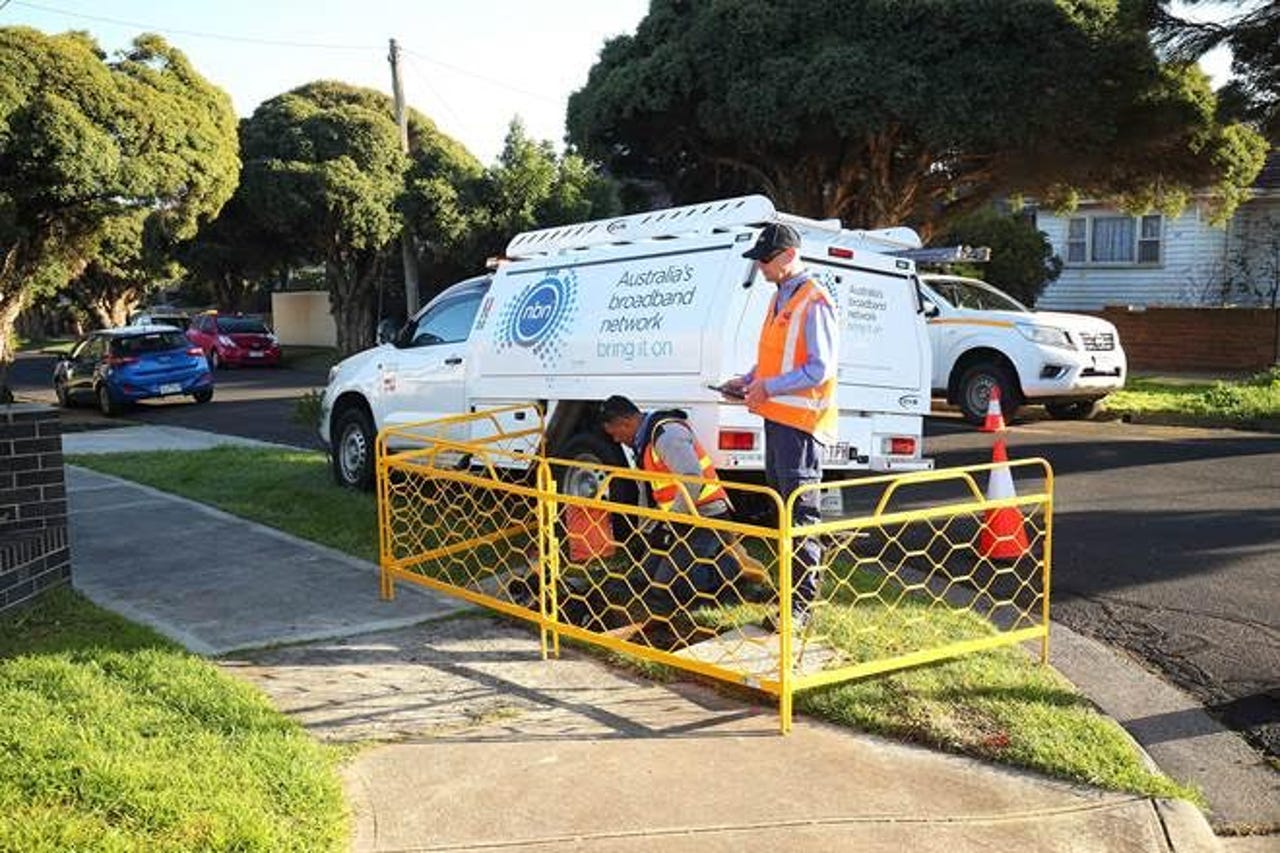































 Image: NBN
Image: NBN If a political party is willing to dig up references to its own stimulus program that saw four young men working on it die in under six months, then it must be smelling something rotten.
On Tuesday, ALP Senator Tony Sheldon described NBN's contracting model as "pink batts on overdrive".
The final report [PDF] of the Royal Commission into the Home Insulation Program said the government should have done more to protect workers.
"The reality is that the Australian government conceived of, devised, designed, and implemented a program that enabled very large numbers of inexperienced workers -- often engaged by unscrupulous and avaricious employers or head contractors, who were themselves inexperienced in insulation installation -- to undertake potentially dangerous work."
With the exception of the four tragic deaths, it was a scenario that sounded familiar as a number of subcontractors described their work conditions and arrangements, which included middlemen relationships that saw prime contractors keeping up to 40% of subcontractor pay.
"We're all proprietary limited companies," subcontractor Burak Sagol said.
"Our worker's comp, [superannuation], sick days, annual leave, any training and accreditation we need, those days are also unpaid days off, which we pay for the courses. The vehicles, our tools, [and] any maintenance for anything we need to get the job done are our responsibility, and we fund all of those.
"Our rates have not changed over the last five years."
Thanks to NBN's issues with its SMAX booking system deployment, technicians are getting a AU$75 enablement fee for each job, which is effectively doubling subcontractor revenue.
"Only because of this, am I able to keep working. If the enablement fee is removed by NBN at the end of October, then I'll probably have to look for another job. It's that simple," technician Steve Nedelkovski said.
"I think that enablement fee is what's keeping people in the field at the moment because, on average, at the moment from myself and a few of the technicians that I speak to, we're getting between two to three jobs on a good day; you might get four. Without the enablement fee that's between AU$190 and AU$240 a day; with the enablement fee, it doubles that."
Nedelkovski said although some people working under prime contractors had up to eight jobs a day to complete, some were very unqualified for the role.
"I'd go out there and have to solve the problem that seven or eight technicians couldn't solve," he said. "It wasn't on one occasion, many, many occasions."
Sagol described how contractors are punished for not completing jobs with issues that are beyond their control.
"If there's an issue with a network where a builder hasn't put in a pipe -- from the side of the house to the street, or NBN design is wrong -- we don't get a payment that I believe we deserve," he said.
"It might be AU$47 for two hours on-site where I might try and get through a 120-metre length of pipe and hit that block at the last 20 metres and we don't get paid for that.
"That's happened in the past where you're three hours in, and you're incomplete, and you get AU$47 before taxes, before expenses, before everything you've done on that day."
CEPU national president Shane Murphy said NBN had failed to put in place any accountability for its workforce or its practices.
"NBN Co has effectively outsourced the backbone of its workforce, the installation repair technicians, which has allowed a series of companies to gain the system and profit from a taxpayer-funded project," Murphy said.
"We hold grave concerns about much of the conduct reported to us within the network. Stories of not just favouritism but forgery and fraud, favouritism where some managers are reportedly receiving kickbacks for favours, other secretly operating companies through relatives receiving work allocated by vendors subcontractors."
Murphy said the kickbacks including illegal substances such as cocaine.
"A project that was to be a source of pride has developed a highly sinister underbelly of mistreatment and malfeasance that should be a source of shame," he added.
Appearing later in the hearing, NBN COO Kathrine Dyer said it did not sound "like a good environment", and if the matter was raised with NBN, it would be fully investigated.
In March, Dyer said the company had a very strict governance model, but that it was only contracted with its delivery partners.
"We're very mindful of ... the contracts that we have with them but .... it's not something that we monitor, we monitor our relationship with our contractors," she said at the time.
"We are very confident in our governance and audit process we have in place with our delivery partners that they are complying with the nature of the contracts that we have with them."
Weighing in, CEO Stephen Rue said NBN could direct one of its contractors to provide a statutory declaration that subcontractors have been paid, but that he wasn't aware of any breach.
"Surely it's the obligation of the delivery partner to comply with all legislation, laws, employment law, health and safety etcetera, and our contracts with them require them to do that," Rue said.
"It is the delivery partners obligation to comply with the law."
 Etiquetas calientes:
negocio
empresas
Etiquetas calientes:
negocio
empresas